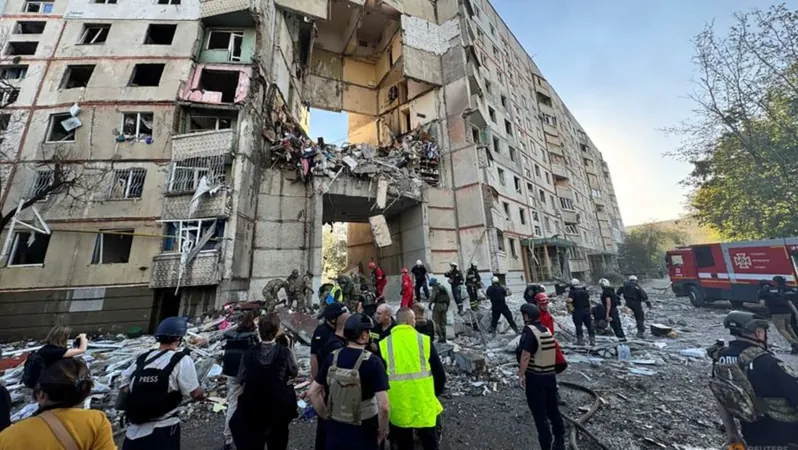
NATO Readies for Mass Casualty Evacuations: Are We on the Brink of a New Conflict with Russia?
2024-09-25
NATO's Urgent Plans for Evacuations
In a striking development amid ongoing tensions with Russia, NATO has initiated plans to urgently coordinate the evacuation of large numbers of wounded troops in the event of an armed conflict. This preparation involves the potential use of hospital trains, as air evacuations may pose significant risks due to threatened airspace from Russian defenses.
Comments from NATO Leadership
Lieutenant-General Alexander Sollfrank, head of NATO's logistics command, emphasized the gravity of the situation in a recent interview. He stated that a war with Russia would not only create a larger battlefield but would likely see a heightened number of casualties, coupled with a temporary incapacity for air superiority near the front lines. "The challenge will be to swiftly ensure high-quality care for, in the worst case, a significant number of wounded," he warned, though specific casualty estimates remain unprovided.
NATO's Strategic Response to Russian Aggression
This strategic pivot to medical evacuation planning is reflective of NATO's broader response to Russia's aggressive posture and the ramifications of the 2022 invasion of Ukraine. The European military alliance is determined to bolster its deterrence and defensive capabilities in light of these escalating threats. Notably, the German military foresees the possibility of a Russian assault on a NATO country as early as 2029. Meanwhile, President Vladimir Putin has labeled Western nations as the aggressor, accusing them of escalating conflict through military support to Ukraine.
Operational Challenges of Medical Evacuations
At the helm of NATO's Joint Support and Enabling Command (JSEC), Sollfrank is tasked with facilitating the rapid transit of troops and equipment across Europe, while also managing the logistics of resource storage along NATO’s eastern border. Recently, JSEC conducted an exercise simulating patient flow coordination under the impending threat of conflict.
Innovative Solutions for Medical Transport
Sollfrank highlighted the unique challenges associated with a potential war against Russia compared to previous conflicts in Afghanistan and Iraq. Russian missile systems and aircraft would imperil medical evacuation efforts, necessitating innovative transport solutions such as hospital trains, which allow for the simultaneous movement of multiple casualties—something aircraft may struggle to achieve.
The Importance of Air Superiority
"Achieving air superiority will be critical and will require time to establish across the entire front," he noted, stressing the need for meticulous planning to ensure medical installations can receive a high volume of wounded patients, potentially utilizing both trains and buses to adapt to battlefield conditions.
Overcoming Regulatory Challenges
Moreover, Sollfrank identified the variance in medical regulations across NATO member states as a significant obstacle. He proposed the idea of a "military medical Schengen," similar to the existing political Schengen zone in the EU, to facilitate the unencumbered movement of critical medical supplies across borders. This framework could permit the free transport of essential medications, such as narcotics and potent painkillers, which are crucial for the effective treatment of injured personnel.
Global Security Implications
As NATO ramps up its defensive strategies in response to a resurgent Russian threat, the implications for global security are immense. Will this lead to an escalation in hostilities, or will diplomacy prevail? The world watches closely as tensions simmer just below the surface, with potential ramifications echoing beyond European borders.



 Brasil (PT)
Brasil (PT)
 Canada (EN)
Canada (EN)
 Chile (ES)
Chile (ES)
 España (ES)
España (ES)
 France (FR)
France (FR)
 Hong Kong (EN)
Hong Kong (EN)
 Italia (IT)
Italia (IT)
 日本 (JA)
日本 (JA)
 Magyarország (HU)
Magyarország (HU)
 Norge (NO)
Norge (NO)
 Polska (PL)
Polska (PL)
 Schweiz (DE)
Schweiz (DE)
 Singapore (EN)
Singapore (EN)
 Sverige (SV)
Sverige (SV)
 Suomi (FI)
Suomi (FI)
 Türkiye (TR)
Türkiye (TR)